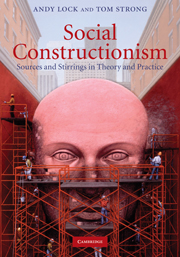Book contents
- Frontmatter
- Contents
- Preface
- Acknowledgements
- 1 Introduction
- 2 Giambattista Vico
- 3 Phenomenology
- 4 Hermeneutics
- 5 Marxism and language
- 6 Lev Vygotsky
- 7 Meanings and perspectives
- 8 Ludwig Wittgenstein
- 9 Gregory Bateson
- 10 Sociologies – Micro and Macro
- 11 Sources of the self
- 12 Michel Foucault and his challenges
- 13 Discourse analysis
- 14 Ken and Mary Gergen
- 15 Rom Harré
- 16 John Shotter
- 17 Concluding remarks
- Bibliography
- Index
9 - Gregory Bateson
A Cybernetic View of Communication and Human Interaction
Published online by Cambridge University Press: 05 June 2012
- Frontmatter
- Contents
- Preface
- Acknowledgements
- 1 Introduction
- 2 Giambattista Vico
- 3 Phenomenology
- 4 Hermeneutics
- 5 Marxism and language
- 6 Lev Vygotsky
- 7 Meanings and perspectives
- 8 Ludwig Wittgenstein
- 9 Gregory Bateson
- 10 Sociologies – Micro and Macro
- 11 Sources of the self
- 12 Michel Foucault and his challenges
- 13 Discourse analysis
- 14 Ken and Mary Gergen
- 15 Rom Harré
- 16 John Shotter
- 17 Concluding remarks
- Bibliography
- Index
Summary
Rigor alone is paralytic death, but imagination alone is insanity.
(Bateson, as cited in Keeney, 1983: 94)How is it that people interacting over time come to create understandings and actions so familiar to them that they seem ‘patterned’? To what extent can people be seen as apart from, or as a part of, patterns they share with others? Where might a patterned view of interaction fit with problems and solutions in therapy, the ecological movement and elsewhere? These kinds of questions fit our consideration of Gregory Bateson.
Gregory Bateson, resident sage at California's Esalen Institute in the 1970s, had a huge influence on family therapists and environmentalists. For Stephen Toulmin (1982), Bateson was that classic frontier figure: the scout. His research and writing spanned more than five decades, encompassing everything from anthropological treatises, genetic research, philosophy, psychology, linguistics, biology, psychiatry, ecology and family therapy. His studies of human communications and relationships will be our primary focus here; otherwise, he could seem an odd addition to a book on social constructionism. He approached communication in both macro and micro ways, bringing together his anthropologist's background to inform rigorous studies of micro-interactions in family therapy. Bateson's chief contribution was to relate patterns to human problems and practices associated with human change, importing biological systems and cybernetic views of relationship. One of his chief concerns was our ‘epistemologizing’, how we ‘punctuate’ reality with limited views of causal relationships.
- Type
- Chapter
- Information
- Social ConstructionismSources and Stirrings in Theory and Practice, pp. 170 - 186Publisher: Cambridge University PressPrint publication year: 2010



